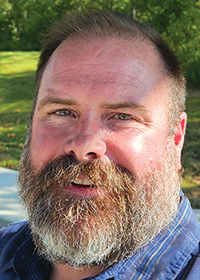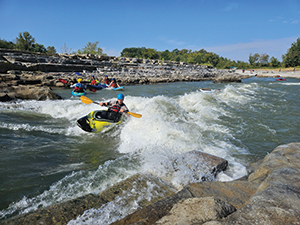Paddleboarders, kayakers and more flock to WOKA Whitewater Park’s grand opening
by October 1, 2023 8:47 am 3,874 views

Jerrid Gelinas of Siloam Springs navigates his standup paddleboard at The Waters of Oklahoma and Arkansas (WOKA) Whitewater Park near Siloam Springs in Watts, Okla.
One of Northwest Arkansas’ newest tourist draws is just across the border in Oklahoma. But there’s no denying that The Waters of Oklahoma and Arkansas (WOKA) Whitewater Park’s ripple effects will be far-reaching.
“We typically have to go a long way for something like this,” said Jerrid Gelinas of Siloam Springs. He’s an avid paddler and president of the Arkansas Canoe Club’s Northwest Arkansas Chapter. “Normally, we go to Tennessee, West Virginia; this is a new opportunity for a lot of paddlers around here. To be out here surfing paddleboards, boogie boards, kayaks, canoes and tubes is really cool.”
Gelinas was one of several hundred visitors to the 30-acre whitewater adventure park during its opening weekend on Sept. 15-17.
“This is like Christmas Day,” said Holly Moore, director of properties and maintenance at the Grand River Dam Authority (GRDA), an Oklahoma state agency that oversees and manages the park.
WOKA is fed by the Illinois River, about seven miles southwest of Siloam Springs near Watts, Okla. The state-of-the-art facility features a 1,200-foot-long, 100-foot-wide channel with eight drops. It has the elements to entertain all levels of kayakers, surfers and tubers. The park also features spectator seating, concessions and souvenir sales, seasonal rentals, restrooms and free Wi-Fi.
“We tried to think of everything,” Moore said.
Officials say WOKA was partially inspired by the city-run Siloam Springs Kayak Park, about eight miles upstream. It opened in 2014 as a regional destination for whitewater enthusiasts and paddle sports athletes — a first-of-its-kind in Arkansas. The 600-foot channel has two engineered drops but does not offer on-site equipment rentals.
Construction of the $33 million WOKA project broke ground three years ago. The park is a partnership between the GRDA, the city of Siloam Springs and the Walton Family Foundation in Bentonville, which provided 95% of the funding. The foundation’s philanthropy also funded the Siloam Springs Kayak Park’s development.
“WOKA is a testament to the collaborative spirit of our community and the dedication of our partners,” said Dan Sullivan, GRDA president and chief executive officer. “This park will not only provide a heart-pounding adventure for watersport enthusiasts but also serve as a source of entertainment for spectators. We are immensely grateful for the historic gift generously given by the Walton Family Foundation, which has made this incredible experience possible.
“We are thrilled to offer WOKA as a major destination with a significant, positive economic impact for the region. WOKA will bring tourism dollars and quality of life enhancements to be enjoyed by all.”
GRDA officials did not provide attendance figures from the opening weekend. Jared Skaggs, GRDA’s director of outdoor experience, said the park was constantly busy.
“In general, we had a few suggestions, but everything that came back was very positive,” he said. “We were steady with small groups of paddlers in private boats throughout the weekend and into the first full week.”
ADVENTUROUS PROJECT
GRDA worked with Denver-based engineering firm McLaughlin Whitewater — a division of Merrick & Co.— for more than five years to design the park and its water features. Crossland Construction Co. was the general contractor.
On a scale of one to 10, Derek Salmonson said creating an artificial whitewater environment was precisely as challenging as it sounds. He said workers blasted about 60,000 cubic yards of rock to form the channel.
“Straight up 12,” Salmonson said. He was Crossland’s project manager during the construction. “Anytime you’re blasting unknown limestone, you don’t know how it will come out; you don’t know how it will be shaped. You’re left with what you have after the explosives detonate.

“Fortunately, we had a phenomenal team that knew exactly what they were doing and really met or exceeded our expectations of the actual slope and side walls of the channel itself.”
Salmonson said Mother Nature presented numerous challenges. While speaking with a reporter along the park’s channel shoreline, he noted that there were times that where they were standing would be under deep water during construction.
“That happened to us multiple times during construction,” he said. “You’re dealing with a river with a rise and fall of over 20 feet during flood stages. “You get a certain amount of work done, and a flood would come and wipe out a lot of it. Then you’ve got to clean that up and get the mud out before we can start work again.”
Salmonson said the park does have design elements that will help mitigate future clean-up efforts at the park from a river flood — to an extent.
“There’s nothing you can do to stop the river,” he said.
Despite the unique challenges, Salmonson said WOKA was a great project.
“This was my office every day for three years,” he said. “Anytime you walk into a project, and you have no idea how you’re going to build it, there’s a sense of adventure that goes along with that. Crossland had a phenomenal team; the [subcontractors] were phenomenal. Everybody worked well together, and this is the result.”
Skaggs also lauded the engineers and construction team for their creation.
“We have different waves for different enthusiasts,” he said. “We have a river surfing wave, kayak play waves, beginner-friendly waves. As you build confidence and experience, you can play in some larger waves. We have a large enough course for everyone to play at different spots — kayakers, river surfers, standup paddleboarders and tubers. They did an excellent job on the design and layout.”
LOW-COST ATTRACTION
WOKA is cashless and only accepts cards. A $10 parking pass gives visitors park access. For a nominal (and still undetermined) fee, GRDA will offer visitors a season parking pass in 2024.
Life jackets, whitewater-specific helmets and secure footwear (no flip-flops) are required for park visitors who want to enter the whitewater course. Visitors who don’t bring personal vessels will have several options at the park to rent.

Rates are for four hours, and vessels available include solo kayaks ($25), tandem kayaks ($25), solo tubes ($15), family tubes ($40), surfboards ($20), bodyboards ($20) and standup paddleboards ($25).
“We are trying to keep costs low,” Skaggs said. “The goal is, we want people outdoors. Any level — beginner to experienced — can get on the water.”
A GRDA study three years ago estimated WOKA would attract 85,000 visitors each year. That number is nothing to scoff at, but additional park amenities may bring even more visitors. Officials believe the adjacent concrete trails and mountain bike single track — there now and being built — will be a significant quality-of-life improvement for the region and especially the Siloam Springs area.
Earlier this year, the city of Siloam Springs opened a new trail that connects the city’s south side to WOKA. It’s about 6 miles round trip.
“I think 85,000 people is going to be a low number for us now,” Skaggs said.
Skaggs also envisions WOKA as a business incubator for others in the outdoor recreation space.
“We’ve already had a lot of business ventures reach out to us and [ask], ‘We heard what’s in the works; how can we get in on it?’” Skaggs said. “Complementary businesses like flotation, RV parks, restaurants and such.
“We are going to see continued growth in that area. Siloam Springs, Westville (Okla.), Watts — I think they’ll all see more customers, and we will see new businesses for the region.”
